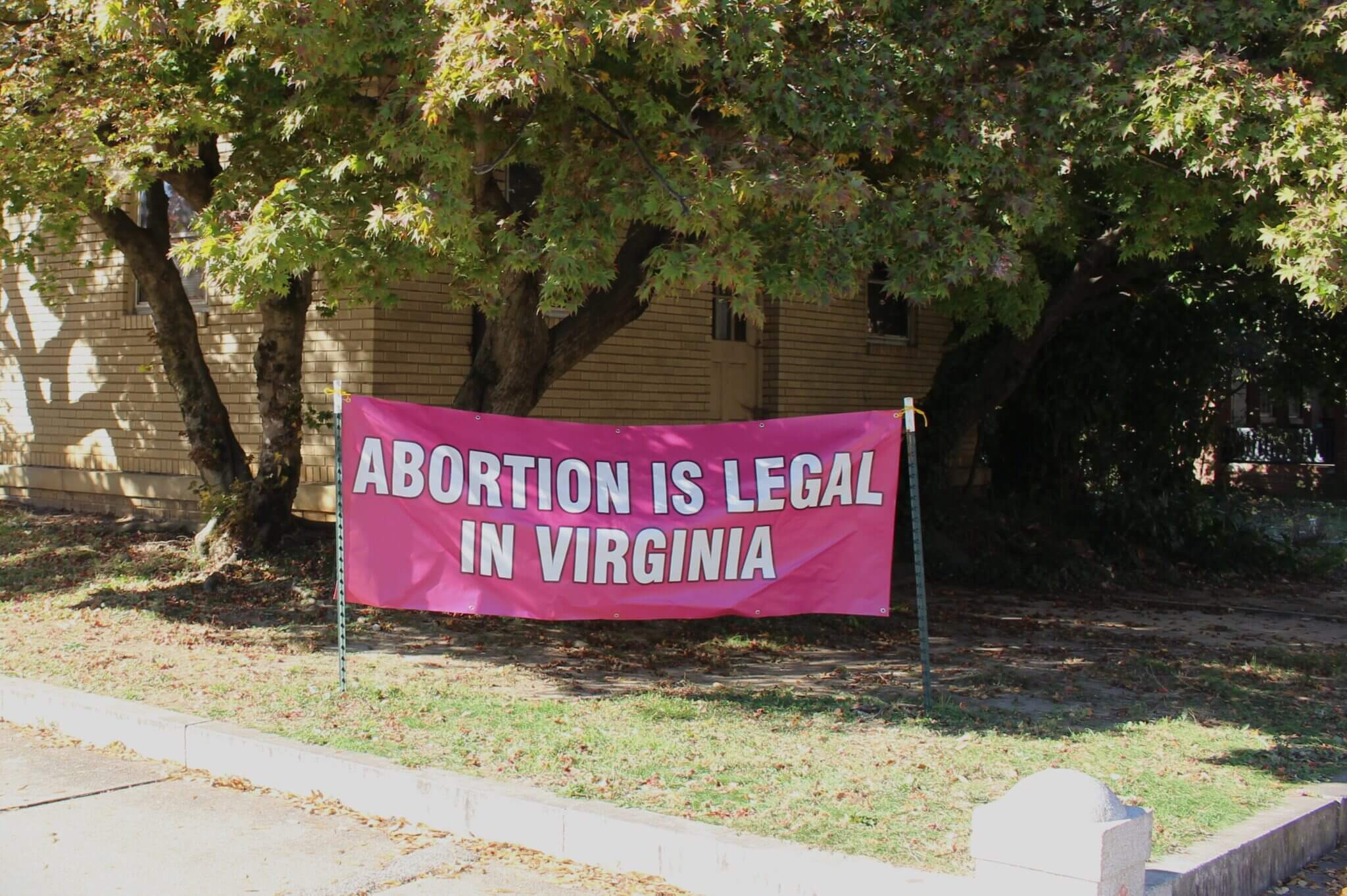
A sign outside a clinic that provides abortions in Richmond, Va. (Sarah Vogelsong / Virginia Mercury)
by Sarah Vogelsong, Virginia Mercury
The use of medication abortion has been rising in Virginia over the past seven years, with more than half of all abortions in the state induced with pills rather than performed by surgery in 2021.
According to data from the Virginia Department of Health, 56% of the roughly 17,000 induced terminations of pregnancy — the state’s legal term for abortion — that occurred in the state in 2021 were the result of medication.
That number has been steadily rising since 2015, when over 27% of the more than 18,600 induced terminations in Virginia were through medication. Virginia women’s increasing reliance on medication to terminate pregnancies is also in line with national trends: According to data from the Guttmacher Institute, a research organization that supports abortion rights, 54% of all U.S. abortions in 2020 were performed via medication rather than surgery.
“Just gradually over time we’ve seen more and more patients choosing this route,” said Dr. Shanthi Ramesh, chief medical director for the Virginia League for Planned Parenthood. “We are really seeing patients for medication abortion almost every day of the week at our sites.”
But abortion in Virginia could look very different if courts uphold parts of a ruling by a federal judge in Texas to halt or limit the Food and Drug Administration’s more than two-decade-old approval of mifepristone, which is used along with misoprostol to terminate pregnancy up to 10 weeks.

The April 7 ruling by U.S. District Court Judge Matthew Kacsmaryk effectively called for a halt to the sale of mifepristone across the U.S. by April 15. Both the U.S. Department of Justice and the manufacturer of a brand-name version of mifepristone, Danco Laboratories, asked the higher U.S. 5th Circuit of Appeals to put that decision on hold but were only partly successful. While the court agreed to continue allowing the sale of the drug on the grounds that the statute of limitations to challenge the original 2000 FDA approval had run out, it let stand other provisions of the Texas ruling that will significantly narrow access to the medication by upholding certain restrictions on its use that were in place prior to 2016.
Those restrictions, which are set to go into effect at 11:59 p.m. Wednesday, will among other changes only allow mifepristone to be used through the seventh week of pregnancy and will bar it from being prescribed via telehealth or mailed.
In the meantime, the Department of Justice and Danco Laboratories have made an emergency request to the U.S. Supreme Court, asking it to uphold the FDA approval of the drug. The court is expected to act by Wednesday night.
A separate ruling by a federal judge in Washington state, handed down minutes after the April 7 Texas decision, temporarily blocked the FDA from “altering the status quo” with regard to mifepristone in 17 states and Washington, D.C. that had argued the agency was imposing unnecessary regulations on the drug. However, Virginia is not a party to that case, meaning it will not be affected by the ruling.
While 13 states have banned most abortions since the U.S. Supreme Court overturned Roe v. Wade last summer, Virginia’s divided government has meant Republicans have made little headway to date in rolling back the state’s expansive abortion rights. Virginia places few restrictions on abortion in the first and second trimesters and allows the procedure in the third if three doctors decide continuing the pregnancy would pose a severe risk to the mother.
Consequently, if upheld, the new limits on mifepristone are poised to be the most consequential narrowing of abortion access the state has seen since the court’s Dobbs decision overturning Roe. And because mifepristone is only authorized for use up to 10 weeks of pregnancy — or, under the restrictions allowed by the appeals court, seven weeks — its biggest impacts in Virginia will be seen among women seeking to end a pregnancy during the first trimester.
Ramesh said that regardless of the Supreme Court’s decision, Planned Parenthood is “committed to providing medication abortion in Virginia” and would continue to offer it under the more restrictive regulations or by relying solely on misoprostol, the second of the two-pill medication abortion regimen approved by the FDA.
“We’re not going anywhere,” she said. “Abortion is not going anywhere, and abortion providers are, for better or for worse, very good at contorting themselves to meet the needs of patients.”
Virginia Mercury is part of States Newsroom, a network of news bureaus supported by grants and a coalition of donors as a 501c(3) public charity. Virginia Mercury maintains editorial independence. Contact Editor Sarah Vogelsong for questions: [email protected]. Follow Virginia Mercury on Facebook and Twitter.
Politics

Biden administration bans noncompete clauses for workers
The Federal Trade Commission (FTC) voted on Tuesday to ban noncompete agreements—those pesky clauses that employers often force their workers to...

Democratic shakeup in Virginia primaries for governor, lieutenant governor
Richmond Mayor Levar Stoney quit his bid for governor and jumped into the race to be the Democratic nominee for lieutenant governor. The race for...
Local News

The zodiac signs of 12 iconic women offer insight into their historic accomplishments
Zodiac signs can tell you a lot about someone’s personality. Whether they’re an earth, water, air, or fire sign, these 12 categories (which are...

Virginia verses: Celebrating 5 poetic icons for National Poetry Month
There’s no shortage of great writers when it comes to our commonwealth. From the haunting verses of Edgar Allan Poe, who found solace in Richmond's...





